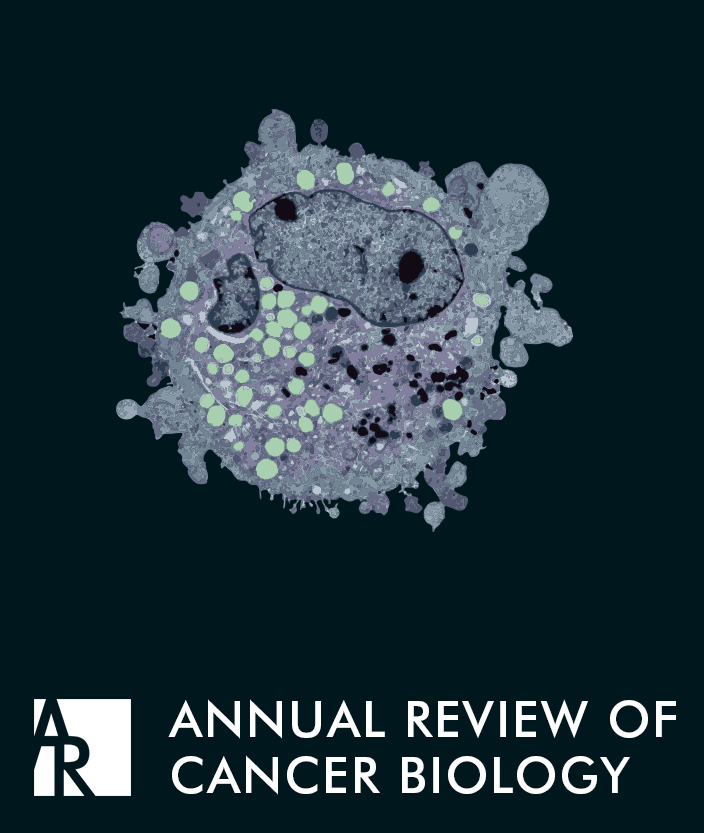单细胞表观基因组学揭示癌症进展机制
IF 6.1
2区 医学
Q1 ONCOLOGY
Annual Review of Cancer Biology-Series
Pub Date : 2022-01-10
DOI:10.1146/annurev-cancerbio-070620-094453
引用次数: 5
摘要
癌症的发生是由遗传和表观遗传畸变之间的合作驱动的,这些畸变破坏了维持特定细胞功能的关键基因调控程序。起始后,细胞获得额外的遗传和表观遗传改变,受肿瘤内在和外在机制的影响,增加肿瘤内异质性,重塑细胞的潜在基因调控网络,促进癌症进化。此外,环境或治疗损伤驱动异质细胞状态的选择,与癌症的发生、维持和耐药性有关。单细胞基因组学的进步已经开始揭示存在于单个肿瘤中的染色质和基因表达状态(细胞状态)的全部曲目。这些单细胞分析表明,细胞在转化过程中通过选择损伤诱导和非谱系调节程序,使其调控状态多样化,从而导致表观基因组可塑性。在这里,我们回顾了最近与癌症进展中调控状态变化相关的研究,并强调了日益增长的单细胞表观基因组学工具包,准备解决该领域尚未解决的问题。《癌症生物学年度评论》第6卷的最终在线出版日期预计为2022年4月。修订后的估计数请参阅http://www.annualreviews.org/page/journal/pubdates。本文章由计算机程序翻译,如有差异,请以英文原文为准。
Single-Cell Epigenomics Reveals Mechanisms of Cancer Progression
Cancer initiation is driven by the cooperation between genetic and epigenetic aberrations that disrupt gene regulatory programs critical to maintain specialized cellular functions. After initiation, cells acquire additional genetic and epigenetic alterations influenced by tumor-intrinsic and -extrinsic mechanisms, which increase intratumoral heterogeneity, reshape the cell's underlying gene regulatory network, and promote cancer evolution. Furthermore, environmental or therapeutic insults drive the selection of heterogeneous cell states, with implications for cancer initiation, maintenance, and drug resistance. The advancement of single-cell genomics has begun to uncover the full repertoire of chromatin and gene expression states (cell states) that exist within individual tumors. These single-cell analyses suggest that cells diversify in their regulatory states upon transformation by co-opting damage-induced and nonlineage regulatory programs that can lead to epigenomic plasticity. Here, we review these recent studies related to regulatory state changes in cancer progression and highlight the growing single-cell epigenomics toolkit poised to address unresolved questions in the field. Expected final online publication date for the Annual Review of Cancer Biology, Volume 6 is April 2022. Please see http://www.annualreviews.org/page/journal/pubdates for revised estimates.
求助全文
通过发布文献求助,成功后即可免费获取论文全文。
去求助
来源期刊

Annual Review of Cancer Biology-Series
Medicine-Oncology
CiteScore
14.50
自引率
1.30%
发文量
13
期刊介绍:
The Annual Review of Cancer Biology offers comprehensive reviews on various topics within cancer research, covering pivotal and emerging areas in the field. As our understanding of cancer's fundamental mechanisms deepens and more findings transition into targeted clinical treatments, the journal is structured around three main themes: Cancer Cell Biology, Tumorigenesis and Cancer Progression, and Translational Cancer Science. The current volume of this journal has transitioned from gated to open access through Annual Reviews' Subscribe to Open program, ensuring all articles are published under a CC BY license.
 求助内容:
求助内容: 应助结果提醒方式:
应助结果提醒方式:


